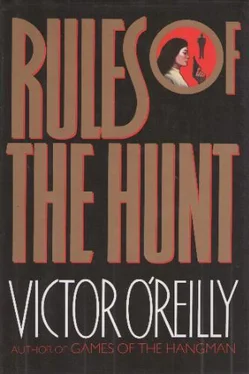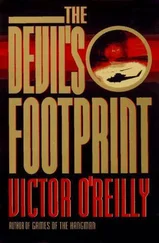Victor O'Reilly - Rules of The Hunt
Здесь есть возможность читать онлайн «Victor O'Reilly - Rules of The Hunt» весь текст электронной книги совершенно бесплатно (целиком полную версию без сокращений). В некоторых случаях можно слушать аудио, скачать через торрент в формате fb2 и присутствует краткое содержание. Жанр: Триллер, на английском языке. Описание произведения, (предисловие) а так же отзывы посетителей доступны на портале библиотеки ЛибКат.
- Название:Rules of The Hunt
- Автор:
- Жанр:
- Год:неизвестен
- ISBN:нет данных
- Рейтинг книги:4 / 5. Голосов: 1
-
Избранное:Добавить в избранное
- Отзывы:
-
Ваша оценка:
- 80
- 1
- 2
- 3
- 4
- 5
Rules of The Hunt: краткое содержание, описание и аннотация
Предлагаем к чтению аннотацию, описание, краткое содержание или предисловие (зависит от того, что написал сам автор книги «Rules of The Hunt»). Если вы не нашли необходимую информацию о книге — напишите в комментариях, мы постараемся отыскать её.
Rules of The Hunt — читать онлайн бесплатно полную книгу (весь текст) целиком
Ниже представлен текст книги, разбитый по страницам. Система сохранения места последней прочитанной страницы, позволяет с удобством читать онлайн бесплатно книгу «Rules of The Hunt», без необходимости каждый раз заново искать на чём Вы остановились. Поставьте закладку, и сможете в любой момент перейти на страницу, на которой закончили чтение.
Интервал:
Закладка:
"The case is solved?" said Adachi with a smile.
"Not exactly, boss," said Fujiwara with a grin. "I think on this one we are going to earn our pay."
Adachi became serious. Fujiwara continued. "We now have several reports of two black limousines in the area around seven in the morning – within the time window, anyway. The models were current-year Toyota Crown Royal Saloons. They were noticed because the two cars were in convoy and there was some speculation as to what dignitary was inside. Otherwise there was nothing suspicious. The windows were tinted, so the witnesses have no idea how many people were inside or who they were. Still, we now have sufficient evidence to indicate that the killers came in went in those cars."
Tokyo was wall to wall with shiny black executive limousines, thought Adachi, and tens of thousands of them would be current-model Toyotas. It did not seem a promising line of inquiry. It was a pity the killers had not favored Cadillacs or Mercedeses. Both makes were comparatively uncommon and were favored by the yakuza. At least he would have a pointer as to where to look. Also, the good thing about leaning on the yakuza was that you normally got a result. To get rid of police harassment, the yakuza had the useful custom of giving up a suspect. The suspect might well not be the guilty party, but he would plead guilty and confess and the police could mark the case closed. In return, the nominated perpetrator would receive a light sentence and when he came out would be greeted by the gang and feted. It was a common way for a gang member to establish himself with his gang. It was, so to speak, part of the apprenticeship system.
Adachi had once described the custom to a visiting police group from the West, and they had been horrified. Personally, Adachi thought the custom had a lot to recommend it. No yakuza operated on his own initiative anyway; actions were always dictated from the top, so the idea of a specific guilt or innocence was somewhat academic. Second, the custom incorporated a built-in check on the crime rate. A yakuza gang did not mind giving up a member now and then for a few years, but it did not help practical operations or morale if half the gang was behind bars. Finally, it made the job of both the police and courts a lot easier, which was good not just for them but for the taxpayer. Everyone gained.
"Nothing helpful like a license plate?" said Adachi helpfully.
"And a signed confession," replied Fujiwara. "Nothing so convenient at the scene. However, a policeman in a koban several blocks away saw a Toyota Crown Royal Saloon of the right year and color parked, and took its number as a matter of routine. The driver was fiddling in the trunk. When questioned, he said he had had a puncture and had just finished changing the tire. The beat cop expressed his sympathy and let the man go, and apart from making a record in his log, thought no more of it. But when he was questioned again, he said one thing struck him afterward – the driver's hands were clean and his uniform was immaculate. Of course, he could have been wearing gloves when he was changing the wheel."
"Did he look at the driver's ID?" asked Adachi. The thought occurred to him that the drive would certainly have had gloves. Even the cabdrivers wore gloves in Japan, and a conscientious chauffeur would certainly come prepared for such an eventuality as a puncture.
"No," said the inspector. "There was no apparent cause. It did not seem polite to question someone who had just had a puncture who was obviously in a hurry."
Adachi grunted. Treating the citizenry politely was all very well, but like most policemen he believed that an extra question or two seldom went amiss. The innocent should have nothing to hide. Of course, everybody really had something they would rather not be known. He thought of Chifune and her secrets and the discretion with which they conducted their sporadic affair.
"One car, not two?" he said.
"One car," said Fujiwara. "Though it could have linked up with a companion nearer its destination. But the make, model, description, and timing fit."
"Was there anyone else in the car?" said Adachi.
"The koban cop did not know," said Fujiwara. "The windows were tinted. He said he thought he saw someone else in the passenger seat, but hadn't a clue about the rear."
"Put that cop on my shit list," said Adachi sourly. "He seems to think he's a social worker, not a policeman. What's the point of having kobans all over the place if the cops stationed there don't keep their eyes open?"
"He got the number," said Fujiwara, in defense of the beat cop. Actually, he thought Adachi's criticism was justified, but he had sympathy for the cops in the field. And the inspector had spent considerably more time working out of a koban than Adachi. "And we have traced it."
"This is not a TV quiz show," said Adachi.
Fujiwara laughed. "You'll like this, boss," he said. "It's registered to the Namaka brothers. It is one of their personal vehicles."
Adachi just stared at him. "Well, I'm buggered," he said. "First a lapel pin, and now this."
The phone on Adachi's desk rang. He picked it up. " Moshi, moshi ," he said – the Japanese equivalent of ‘Hello’. The caller was brief. Adachi put the phone down and stood up. He checked his appearance.
Fujiwara spoke. He knew the signs, and it was not unexpected. "The top floor?" he said.
Adachi nodded. He had a thought floating around he could not seem to be able to grab a hold of. He headed out the door.
The Tokyo Metropolitan Police Department was headed up by the Superintendent-General. Like Adachi, he was a graduate of TokyoUniversityLawSchool and a highflyer. This high flying kept him busy mixing with the movers and shaker of the Tokyo power structure and much too busy with his social obligations to spend a great deal of time on actual police work.
The man who really ran MPD was the Deputy Superintendent-General, the DSG. And everyone knew it.
Adachi headed for the elevator. A group of policemen heading up to a training session were also waiting, and it was clear there would not be room for all of them and Adachi. He was bowed into the elevator and no one followed. The group would travel as a group.
The Deputy Superintendent-General, Saburo Enoke, was not a graduate of Todai. He had gone to a quite respectable provincial university, but owed his advancement to considerable ability and enormous political cunning. The apparently mild-mannered Enoke- san was a force to be feared.
Adachi bowed with deep respect. The Deputy Superintendent-General had always treated him politely, but he could not warm to the man. He had a gray personality that revealed nothing. The eyes behind the designer glasses were intelligent but enigmatic. Enoke- san was an extremely hard man to read.
The chain of command, as far as Adachi was concerned, was clear-cut enough but potentially politically fraught. He was a policeman and a member of the Tokyo MPD and reported ultimately to the Deputy Superintendent-General. However, the direction of specific investigations came from the prosecutor's office. Additionally, both the prosecutor's office and the Tokyo MPD were, in the final analysis, responsible to the Ministry of Justice. And the ministry was headed up by the Minister of Justice, who was a politician and a member of the Diet; and Adachi's little department specialized in investigating corruption of Diet members.
Effectively, Adachi was reporting to some of the very people he was investigating. It was, he thought, an interesting relationship.
The DSG, in addition to the offices of his secretariat, had a conference room of some size at his disposal, and an even larger private office with windows on two sides and an excellent view of central Tokyo. It was generally considered a good sign if he used his private office for an interview. Such was the case on this occasion.
Читать дальшеИнтервал:
Закладка:
Похожие книги на «Rules of The Hunt»
Представляем Вашему вниманию похожие книги на «Rules of The Hunt» списком для выбора. Мы отобрали схожую по названию и смыслу литературу в надежде предоставить читателям больше вариантов отыскать новые, интересные, ещё непрочитанные произведения.
Обсуждение, отзывы о книге «Rules of The Hunt» и просто собственные мнения читателей. Оставьте ваши комментарии, напишите, что Вы думаете о произведении, его смысле или главных героях. Укажите что конкретно понравилось, а что нет, и почему Вы так считаете.




![Беар Гриллс - The Hunt [=The Devil's Sanctuary]](/books/428447/bear-grills-the-hunt-the-devil-s-sanctuary-thumb.webp)







